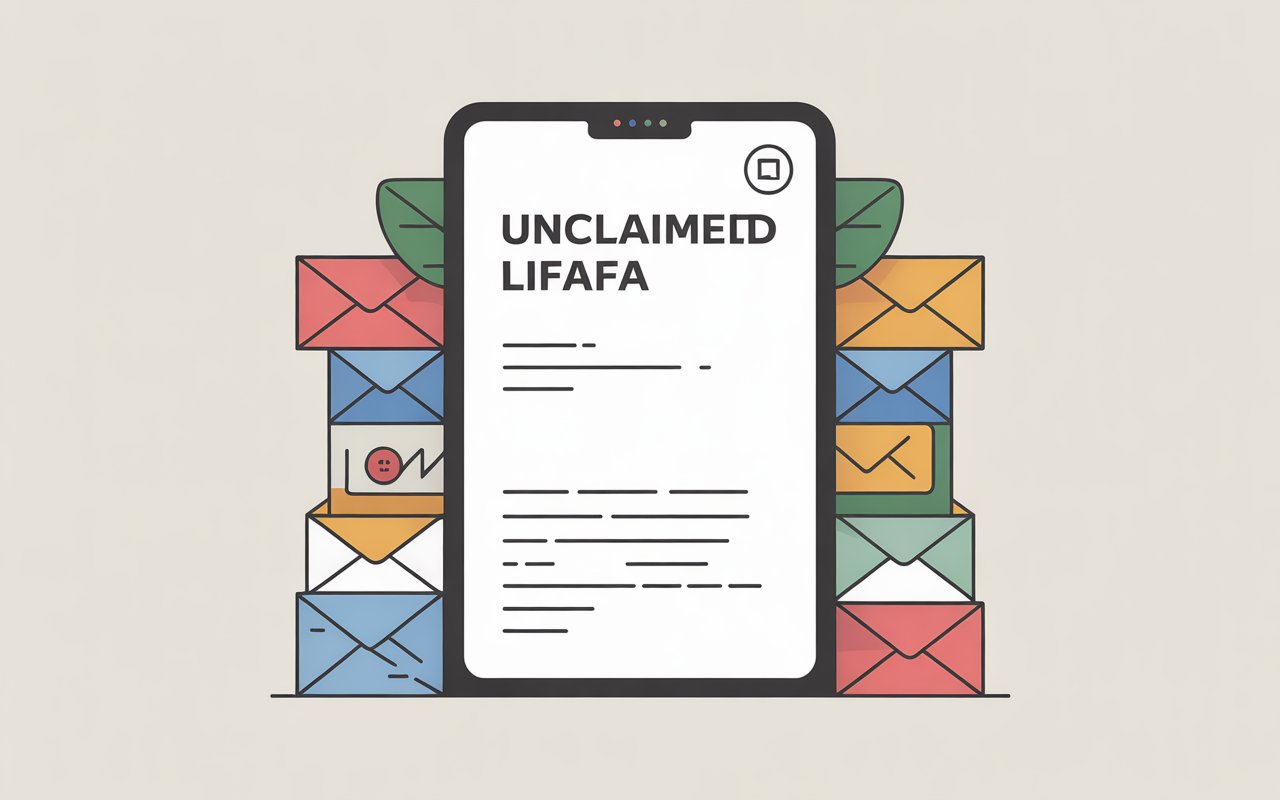Introduction
In the digital era, the traditional postal envelope—commonly referred to as a lifafa—has become less familiar, yet it remains crucial for official, personal, and business communications. Even today, millions of letters, documents, and packages fail to reach their recipients due to incorrect addresses, relocation, or negligence. These undelivered items are referred to as unclaimed lifafa. Unclaimed lifafas not only cause inconvenience to individuals but also impact postal services, businesses, and government operations. This comprehensive guide explores what unclaimed lifafa is, its significance, its effects, prevention strategies, and practical tips for efficient mail management.
What is an Unclaimed Lifafa?
An unclaimed lifafa refers to any letter, document, envelope, or parcel that has not been collected or delivered to the intended recipient. In many languages, including Hindi, the word “lifafa” simply means an envelope, but in modern postal terms, it represents any physical mail that remains unopened or undelivered.
Common Reasons for Unclaimed Lifafa
- Incorrect Address: Wrong pin codes, missing apartment numbers, or typographical errors.
- Recipient Relocation: Individuals moving without updating their postal address.
- Delivery Issues: Temporary unavailability or inaccessibility of the recipient.
- Negligence: Failure to check mailbox regularly.
- Expired Collection Period: Some postal services return letters if not collected within a stipulated time.
LSI Keywords: unopened letters, undelivered envelopes, postal backlog, missed mail, lost letters
Impact of Unclaimed Lifafa on Postal Services
Unclaimed lifafas create significant operational challenges for postal departments:
- Increased Workload: Returned letters and failed deliveries must be processed and re-routed.
- Backlogs: A large volume of unclaimed lifafas can clog postal facilities, delaying other deliveries.
- Higher Costs: Additional resources are needed to track, store, and resend unclaimed letters.
- Customer Dissatisfaction: People and businesses may lose trust in postal services due to delayed or missed deliveries.
Example: Government notices or bank statements delayed due to unclaimed lifafa can affect timely actions, such as bill payments or loan approvals.
Effect on Businesses and Government
Unclaimed lifafa is not just a postal issue—it directly impacts organizational operations:
- Financial Transactions: Undelivered invoices, checks, or tax documents can delay financial processes.
- Operational Delays: Official approvals or legal documents may remain pending.
- Customer Experience: Businesses lose credibility when communication fails.
- Government Notices: Subsidies, certificates, or legal communications may not reach citizens on time, causing administrative complications.
Tip: Organizations should implement regular address verification and tracking systems to reduce unclaimed lifafa.
Easy Steps to Prevent Unclaimed Lifafa
1. Update Your Address Regularly
Keeping postal and official records up to date ensures that letters and documents are sent to the correct address. Inform local post offices, banks, insurance companies, and utility services whenever you move.
2. Check Your Mailbox Consistently
Neglecting mailbox checks is one of the primary reasons for unclaimed lifafas. Allocate a specific time daily or weekly to review your incoming mail.
3. Use Mail Collection Services
Many postal departments offer mail collection and tracking services. This is especially useful for:
- Frequent travelers
- Residents of large apartment complexes
- People relocating temporarily
Mail collection services help organize, track, and deliver letters efficiently, reducing the chance of unclaimed lifafas.
4. Digital Alerts and Notifications
Register for SMS or email notifications offered by postal services or courier companies. Alerts inform recipients about pending deliveries or letters held at the post office.
5. Prepaid or Registered Mail
Sending important documents through registered or insured postal services ensures tracking and accountability, minimizing the risk of unclaimed lifafas.
Real-World Examples
Example 1: Bank Statements
Many customers fail to collect monthly statements due to outdated addresses, causing them to miss important account information.
Example 2: Government Subsidy Payments
Direct Benefit Transfer (DBT) notices or subsidy-related letters may remain unclaimed, delaying financial aid.
Example 3: E-Commerce Deliveries
Orders returned due to incorrect addresses or uncollected parcels can result in customer dissatisfaction and operational costs for businesses.
Example 4: Legal and Official Communications
Court notices, tax notices, or license renewals may remain undelivered, causing legal complications for individuals or companies.
Common Mistakes That Lead to Unclaimed Lifafa
- Ignoring Address Updates: Failing to inform post offices and service providers after relocation.
- Neglecting Mail Checks: Waiting too long before checking the mailbox.
- Using Outdated Postal Services: Some postal methods have strict collection periods.
- Assuming Delivery: Believing that mail will always reach you without tracking.
- Skipping Digital Tracking: Many users overlook the benefits of modern notification systems.
Future Trends in Postal Management
- Digital Mail Tracking: Integration of apps and QR codes to monitor deliveries in real-time.
- Automated Notifications: AI and machine learning used to alert recipients about pending unclaimed lifafas.
- Centralized Address Databases: Reducing errors by linking government, banking, and postal databases.
- Eco-Friendly Practices: Reducing paper lifafas and transitioning to secure digital correspondence to minimize unclaimed mail.
- Enhanced Customer Services: Postal departments introducing flexible pick-up schedules, home delivery, and digital lockers.
Tips to Manage and Reduce Unclaimed Lifafa
- Keep Multiple Contact Points: Add phone, email, and alternate addresses to increase delivery success.
- Track High-Priority Mail: Use registered or insured delivery options for important documents.
- Use Mail Forwarding Services: Forward mail from old addresses to new locations.
- Regularly Audit Your Mailbox: Check both physical and digital correspondence.
- Educate Family Members: Ensure all household members know how to handle incoming mail.
Conclusion
Unclaimed lifafa, though seemingly minor, can lead to financial, operational, and personal inconveniences. By understanding its significance, regularly updating addresses, tracking mail, and utilizing postal services effectively, individuals and businesses can ensure smooth communication. Modern strategies, including digital notifications and registered mail, are invaluable tools in preventing letters and documents from becoming unclaimed lifafas. Ultimately, proper management leads to timely delivery, reduced operational costs, and enhanced trust in both postal services and organizational communication.
Frequently Asked Questions (FAQs)
Q1. What is unclaimed lifafa?
An unclaimed lifafa refers to letters, documents, or envelopes that remain undelivered or unopened by the intended recipient.
Q2. How can I prevent my lifafa from becoming unclaimed?
Update your address regularly, check mailboxes consistently, use mail collection services, and enable digital notifications.
Q3. Can businesses track unclaimed lifafas?
Yes, using registered mail, tracking numbers, and postal management software, businesses can monitor and reduce unclaimed lifafas.
Q4. What happens to unclaimed lifafas?
Typically, they are returned to the sender or held in postal offices for a certain period before disposal or re-delivery.
Q5. Is there a digital alternative to lifafas?
Yes, many organizations are moving to email, e-statements, and digital notifications to reduce unclaimed physical mail.





